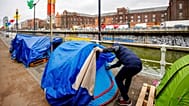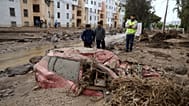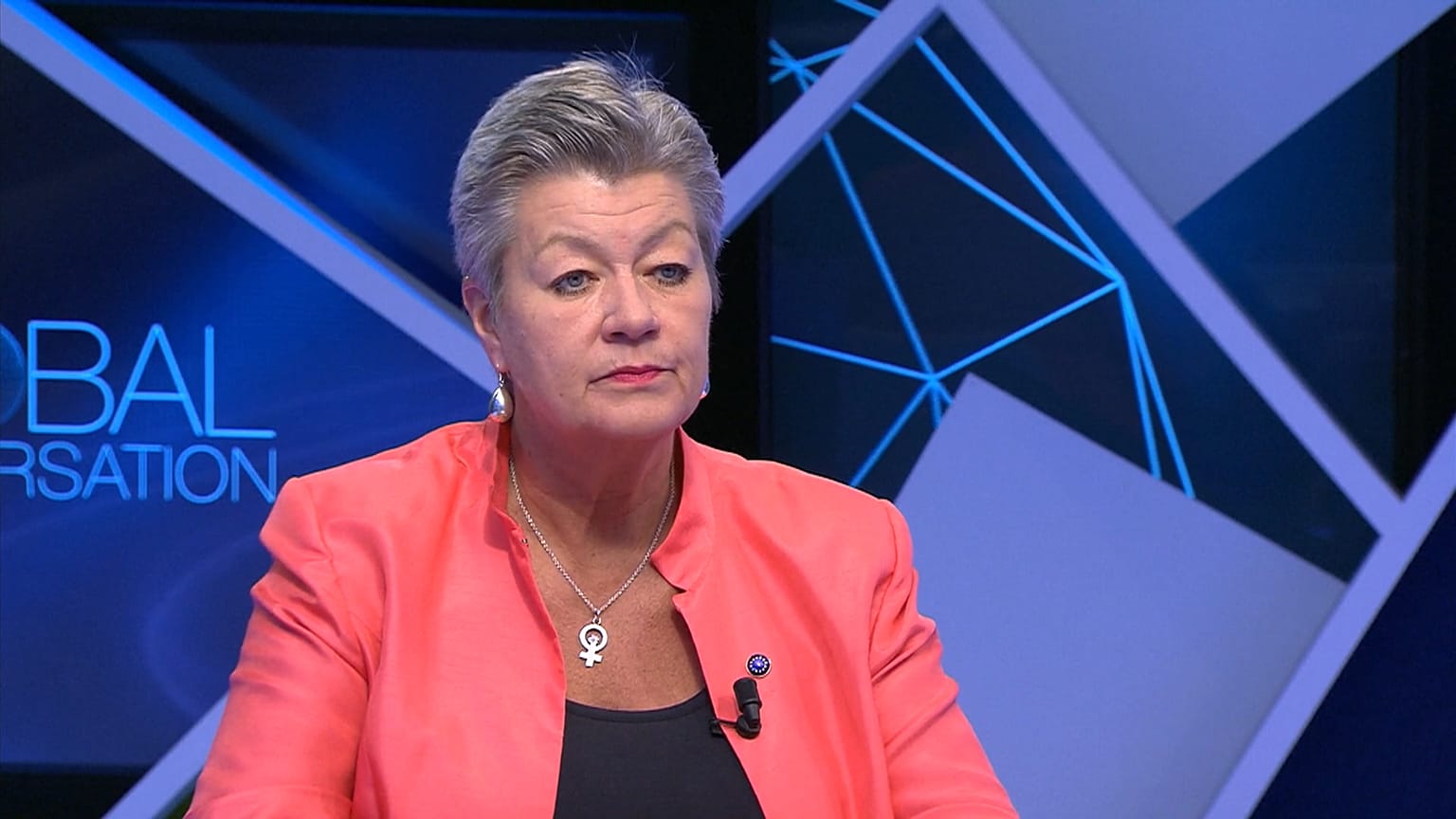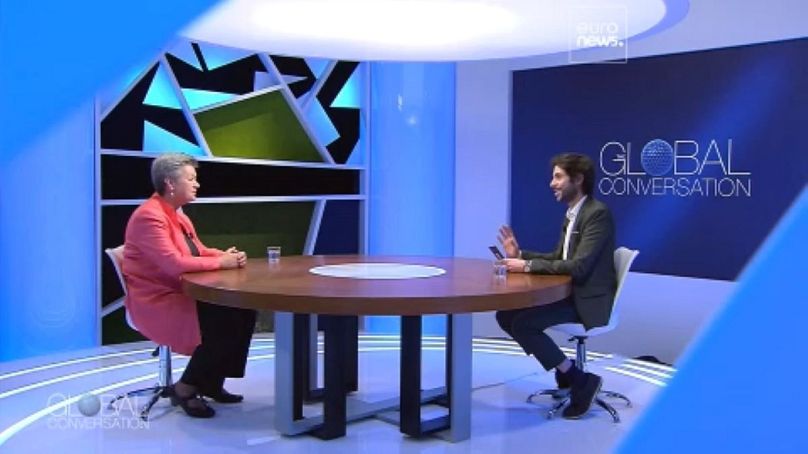Ylva Johansson, the European Commissioner for Home Affairs, discusses the EU's new polarising pact on migration and asylum in the Global Conversation.
The European Parliament gave the Pact on Migration and Asylum the greenlight on 10 April - a comprehensive set of rules establishing a common asylum system that builds upon previous reforms.
 ADVERTISEMENT
ADVERTISEMENT
 ADVERTISEMENT
ADVERTISEMENT
The narrowly-approved measures aim to improve border protection, enhance cooperation on asylum and monitor the reception of migrants and their relocation.
While the European Commission hailed the landmark pact as a fair agreement grounded in EU values, some member states and MEPs from across the political spectrum criticised the deal.
Approving lawmakers described it as a necessary move, however, many Green and left-wing MEPs said the package panders to right-wing populists.
The reform requires 'mandatory solidarity' to ensure all countries, regardless of their size and location, help alleviate the pressure that illegal migrant landings place on southern Europe, this includes resettlement and streamlined bureaucracy at national borders.
Germany described the deal as a 'historic, indispensable step' for the European Union. Poland, Hungary and France's National Rally, on the other hand, voiced their dissatisfaction with the pact arguing it goes against national sovereignty. Meanwhile, NGOs and activists stated it does not go far enough to protect people's lives and human rights.
The pact's approval comes just weeks before the European elections on 6-9 June where it is expected to play a key role, but first, member states are scheduled to vote on the proposal on 29 April. If a qualified majority is reached, it will be adopted.
Euronews Correspondent Vincenzo Genovese sat down with the European Commissioner for Home Affairs, Ylva Johansson, to discuss opposition to the agreement and why Brussels maintains the deal will enhance the EU's ability to respond to migration challenges more effectively.
To watch this episode of the Global Conversation, click on the video in the media player above or read the full interview below.
Vincenzo Genovese, Euronews: The European Parliament has just approved the pact on migration and asylum. What does it mean for the EU's migration policy?
Ylva Johansson, European Commissioner for Home Affairs: It means a lot. It's a huge, huge achievement: it is the first time that we have come to a common, comprehensive European approach towards migration and asylum. So that means also that we have rebuilt trust between member states but also between the Council and Parliament.
So we are much, much stronger, when it comes to migration and asylum, both in protecting our borders and better protecting the fundamental rights of asylum seekers and the vulnerable ones.
Vincenzo Genovese, Euronews: Can you ensure that human rights will not be violated, for example, by unjustified detentions or returns of migrant people to not safe third countries?
Ylva Johansson, European Commissioner for Home Affairs: Yes, I can, because this is very, very clear in the legislation that we are actually strengthening the protection of the fundamental rights of asylum seekers, the right to apply for asylum and specific safeguards for the vulnerable ones.
Vincenzo Genovese, Euronews: One of the elements is the solidarity mechanism. However, the prime ministers of Poland and Hungary reacted suggesting they will not apply the solidarity mechanism in their countries. What happens if they won't?
Ylva Johansson, European Commissioner for Home Affairs: I must say that I am pretty convinced that member states will implement the pact now, quite quickly. They seem to be quite eager to do the implementation and I'm convinced that they will also apply it.
Vincenzo Genovese, Euronews: But concretely, what happens if they don't in terms of tools that the Commission has to prevent this?
Ylva Johansson, European Commissioner for Home Affairs: Well, the Commission has the tools it has in all legislative processes and we can use infringement. But I must say, again, I don't think that will happen. So those who say 'We will not do mandatory relocation' are talking about something else, because that is not what's in the pact.
Vincenzo Genovese, Euronews: The 'solidarity pool' foresees 30,000 migration relocations per year (those who irregularly enter the EU). Last year, Frontex reported more than 380,000 irregular crossings. So don't you fear this is a drop in the bucket?
Ylva Johansson, European Commissioner for Home Affairs: No, this is huge. I mean, when we, for example, did relocation after the fire in Moria, if you remember, a few years ago, there was a huge relocation exercise that took place, especially with unaccompanied minors for many years. We relocated 5,000. So 30,000 every year is really huge.
Vincenzo Genovese, Euronews: 2023 has been the deadliest year in the Mediterranean Sea since 2017. More than 3,000 migrant people died. How can the pact change this, given that there is no European search and rescue mission in it?
Ylva Johansson, European Commissioner for Home Affairs: Fighting the smugglers is the most important part, of making sure that we do not see this tragic loss of life. And that's why I initiated this global alliance to fight migrant smuggling in November last year. And that's why I presented new legislation in this area.
The other important thing we need to do is to step up on legal migration. We are an ageing society in Europe. We need migrants, but they have to come in an orderly way.
Vincenzo Genovese, Euronews: But once the migrant people are on the boats, why not rescue them?
Ylva Johansson, European Commissioner for Home Affairs: Of course, they should be rescued if they are in distress. And this is also what's happening. But we also know that even though the rescue operations are growing more and more, we still see a lot of lost lives. Because when you are in a boat, in these weather conditions, there is a huge, huge risk. And that's why we have to prevent these departures in the first place.
Vincenzo Genovese, Euronews: Also speaking about the Mediterranean Sea, the memorandum with Tunisia and the agreement with Egypt are part of the external dimension of EU migration policy. How can we ensure that human rights are respected in these countries?
Ylva Johansson, European Commissioner for Home Affairs: Well, we do make sure that EU money and what we are engaging in never violates any human rights. And we have great scrutiny of that. We cannot be sure that what happens outside what we are engaged in, could happen in the country.
We know that we have the neighbours that we have, and we have to work with them to try to improve things. And we can't wait until all problems are solved in a country, because we have to work with them also to help to solve the challenges that they are facing.
The EU's money and the projects that we are involved in, we have very tough scrutiny on how we use our money and what kind of projects we are involved in.
Vincenzo Genovese, Euronews: Since 2017, the EU has spent €59 million to finance border and migration management in Libya. But the Libyan Coast Guard has a track record of human rights violations, last week it shot towards a European NGO that was carrying out a rescue operation and was not the first time. So do you consider the cooperation with Libya a failure, or not?
Ylva Johansson, European Commissioner for Home Affairs: The cooperation with Libya is difficult. We have to say that. And we have strong views, for example, when it comes to these detention centres that are awful. Some of those are really in unacceptable conditions.
So where we are rescuing refugees out of Libya, taking them in this emergency transit mechanism to safer countries, where they can be relocated to member states or other third countries, or where we are also supporting, via IOM, the voluntary return of migrants out of Libya. We also need to support them to do the search and rescue, so that people will not lose their lives in the Mediterranean.
Vincenzo Genovese, Euronews: Do you mean search rescue carried by Libyan coast guards?
Ylva Johansson, European Commissioner for Home Affairs: Well, yes. They are also the ones who had to do the search or rescue. But then we are criticising what happened with people afterwards because, in these centres that they are usually being brought to, we know that the conditions are very dire.
And I just said unacceptable. That's why we are calling on the Libyans to change this, close these centres and stop the arbitrary detention of migrants in these centres.
Vincenzo Genovese, Euronews: An EU member state, Italy, is externalising the processing of some asylum requests to Albania, which is a non-EU country. Is this the right way to go?
Ylva Johansson, European Commissioner for Home Affairs: The plan is to take people that are being rescued in international waters, not in Italian waters, and to disembark them in the centre in Albania, where their asylum applications if they apply for asylum, will be processed by Italian authorities according to Italian law.
And if they have the right to asylum, they will be brought to Italy. So this is the plan. So let's see how this will work. But I think it's a very specific path for Italy.
If backed by the European Council the pact will come into force in 2026.















